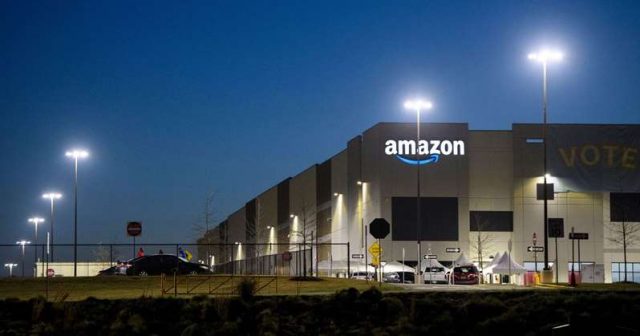MSN News
A first-of-its kind vote to unionize an Amazon warehouse has failed. The company secured a majority of no votes on Friday, defeating an effort from the Retail, Wholesale, and Department Store Workers Union. By late Friday morning, the regional National Labor Relations Board had tallied 1608 no votes for Amazon, over half of the 3,215 votes cast.
But the story isn’t over. The union has already filed an objection to the NLRB, arguing that Amazon violated labor law in the weeks leading up to the vote. It says it will also present evidence to the NLRB’s regional director to support what’s called an “unfair labor practice” complaint for “unlawfully interfering with the protected right of employees to engage in union activity.” If the NLRB agrees with the union, it may set aside Friday’s result, which would allow for a new election.
“Amazon has left no stone unturned in its efforts to gaslight its own employees. We won’t let Amazon’s lies, deception and illegal activities go unchallenged, which is why we are formally filing charges against all of the egregious and blatantly illegal actions taken by Amazon during the union vote,” said Stuart Appelbaum, the union’s president, adding that “Amazon’s behavior during the election cannot be ignored and our union will seek remedy to each and every improper action Amazon took.”
The Bessemer campaign attracted an unusual degree of attention. That’s due in part to the parties involved — Amazon is one of the most easily-recognized corporate brand names in the world ‚— and to the support the union drew. In late February, President Joe Biden released a video telling Bessemer workers that they had a legal right to organize. Biden’s message stoked national interest in the election, as did Amazon’s anti-union tactics. Amazon asked the NLRB to force workers to vote in person, despite the pandemic, but the NLRB rejected the request. During the vote count, Amazon challenged around 500 ballots, most of them likely yes votes, according to Reuters, though this number isn’t enough to change Friday’s result on its own.
Amazon also applied enormous pressure to workers. The company flyered warehouse bathrooms with anti-union material; workers received multiple emails and texts a day urging them to vote “no.” Darryl Richardson, a worker who supported a union, previously told Intelligencer that Amazon flew in managers from out of town to “walk around talking to employees about why we don’t need the union.” On Twitter, Representative Andy Levin of Michigan, a Democrat, said that the goal of companies like Amazon is to “create so much pressure, anxiety and fear—and to make workers feel that the pressure will never go away as long as the union is around…that workers feel they have no choice but to vote NO, like someone crying uncle when they have been threatened relentlessly for days, weeks and months.”
Amazon’s methods may threaten its victory. The Washington Post reported earlier on Thursday that Amazon pressured the U.S. Postal Service into installing a mailbox outside the Bessemer facility. The NLRB had previously rejected a request from Amazon to place mailboxes in the facility for in-person voting, on the basis that doing so would appear to allow Amazon to surveil and potentially retaliate against workers. “Even though the NLRB definitively denied Amazon’s request for a drop box on the warehouse property, Amazon felt it was above the law and worked with the postal service anyway to install one,” Stuart Appelbaum, president of the RWDSU, told the Post. Amazon also urged workers to use the mailbox by the first of March – weeks before voting was scheduled to conclude. As the Post observed, Amazon defended the mailbox as a way to make it “convenient, safe, and private for our employees to vote on their way to and from work if they choose to.”
Other tactics might not violate the law as it stands, however – and advocates for labor say that’s a problem. The PRO Act, which recently passed the House for a second time, would have restrained Amazon’s hand. Ryan Kekeris, an organizer with the International Union of Painters and Allied Trades, said that had the PRO Act been law, the election in Bessemer would have been “nearly unrecognizable.”
Amazon wouldn’t have had standing to change the proposed bargaining size, Kekeris added, which means that the union would have retained an initially proposed bargaining unit of about 1,500 workers, instead of the nearly 5,000 that Amazon lobbied for. Amazon also wouldn’t have been able to subject workers to captive audience meetings, during which the company presents anti-union material, and would have had to disclose the identities of anti-union consultants and lawyers it hired.
And the infamous mailbox “likely would have triggered PRO Act’s card check provision,” he said, which would have allowed the union to submit a simple majority of signed cards to the NLRB without an election. Had that occurred, Kekeris believes “the workers would likely have already had a union at this point, and Amazon would be compelled to bargain under PRO’s first contract provision.”
Though the loss is a blow for RWDSU, Friday’s outcome is not the end. Beyond the challenging of the vote, other warehouses may also still seek to unionize; Bessemer is likely the first salvo in a longer war. As Amazon spread throughout the country, so too has worker discontent. Amazon workers in Chicago organized a walkout on Wednesday, interrupting a 1:20 to 11:15 am “megacycle” shift demanding an extra $2 per hour for the night shift and that the company respect their full 20-minute break. During the pandemic, workers in Chicago, New York City, Minneapolis and elsewhere staged protests and walkouts decrying what they described as a high risk of COVID infection inside the company’s warehouses.
Amazon itself remains a tempting target for unions like RWDSU, who view the company’s labor practices as an imminent danger to workers. Amazon has grown so large, and so wealthy, that any coordinated effort to unionize its warehouses nationwide may take years to win. This is a long fight. Friday was just one battle in it.





